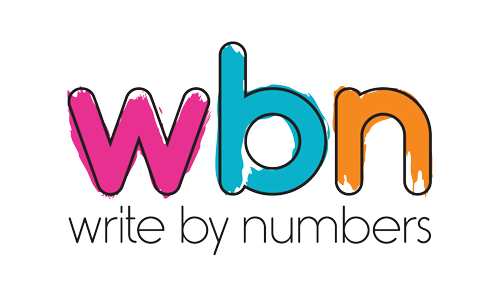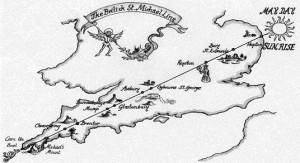For the first time since March in 2013 we’ve had a six weeks where we’ve not been either making a new show or touring an existing one. This break finished last week – there was a re-draft of Blueprint which basically involved me, a white board, a marker pen and the frantic look of someone who is attempting to make a play which is composed of fifty individual one minute plays work (seriously, who thought that was a good idea?). This third draft of Blueprint is nicknamed the “jenga draft” for very good reason. Today Charlie and I had our first proper text meeting for Regeneration which we’re developing with support from Rich Mix, having scratched 15 minutes of it in November at Salisbury Arts Centre’s Practice. And soon Estelle will be back in the rehearsal room with Reasons for Listing. And then more Albion in the spring. And Blueprint in the early summer. And onwards, (hopefully) onwards.
But with this (slight) down time we’ve done some thinking and planning and (even) some not-working. So, possibly falling beyond even the category of being “fashionably late”, here’s our look back – and forward – of WBN…
Andy:
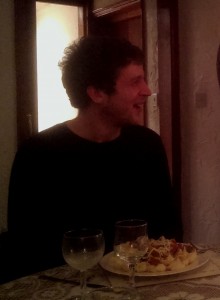 Favourite WBN work related thing of 2013: Taking Beneath the Albion Sky back to Exeter’s Bike Shed Theatre in October. Albion had already appeared in two incarnations at the Bike Shed, once at a scratch night the previous November, and then for Exeter’s Ignite Festival in June. When we showed up again in October, Albion had just done two weeks in very different spaces in Hackney and Bristol. It was great to perform it again in that lovely, bare cavernous space, which suits the mood of the piece perfectly.
Favourite WBN work related thing of 2013: Taking Beneath the Albion Sky back to Exeter’s Bike Shed Theatre in October. Albion had already appeared in two incarnations at the Bike Shed, once at a scratch night the previous November, and then for Exeter’s Ignite Festival in June. When we showed up again in October, Albion had just done two weeks in very different spaces in Hackney and Bristol. It was great to perform it again in that lovely, bare cavernous space, which suits the mood of the piece perfectly.
Favourite WBN non-worked related thing of 2013: It’s Thursday Night. It’s Scarborough. You’re cold. You need a drink. It’s time for MECCA BINGO, people!
Something that was hard or difficult in 2013: Rehearsing at the WBN office at the Albany is normally a pleasure. Charlie and I would sit with a coffee while he patiently waited for my brain to start working, then we’d lay out our chapter titles for each section of the show on a little trail of A4 sheets, and then we’d absorb ourselves in our work, serenely focused on our own little creation without any distraction from the outside world. Unless it’s a Wednesday afternoon and the market is on just outside our window. Some of those market traders like music. Doing the quietest, saddest, smallest piece of the play while the finale from Les Miserables is blaring in through the closed windows was difficult, but oddly moving.
Something you’re looking forward to in 2014: The next Christmas social, in which an even greater variety of alcohols will be consumed, and I will hopefully have another religious experience while watching It’s A Wonderful Life.
Charlie:
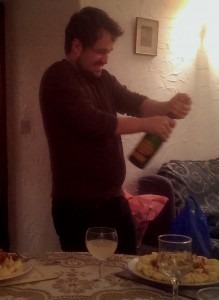 Favourite WBN work related thing of 2013: The opening night of Albion at Ignite Festival in Exeter in June. The feeling that all the work had been done (finally!) and people really liked the show and maybe I sort of knew a little about what I was doing. That I wasn’t entirely deluded about writing and directing!
Favourite WBN work related thing of 2013: The opening night of Albion at Ignite Festival in Exeter in June. The feeling that all the work had been done (finally!) and people really liked the show and maybe I sort of knew a little about what I was doing. That I wasn’t entirely deluded about writing and directing!
Favourite WBN non-worked related thing of 2013: Running manically across Salisbury in order to catch the last train back to London after Salisbury Arts Centre’s Practice (with Corinne being ridiculous and not being able to breathe from the running), making the train, having a great creative chat on the way home and then eating a nice burrito from Waterloo Station.
Something that was hard or difficult in 2013: Working TEN days in a row at Spektrix in order to make up for all the time I’d taken off for WBN.
Something you’re looking forward to in 2014: Still being alive come Christmas and not being a hollowed out husk of a human being. Oh, and hopefully finding an excuse to turn up at Ignite Festival.
Corinne:
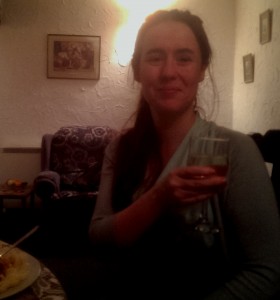 Favourite WBN work related happening of 2013: All of Ignite Festival with its glorious sunshine, theatre for a pound, talking into the early hours of the morning about the meaning of life, meeting other awesome theatre makers, falling in love with the Bike Shed, Albion being better received than I could have imagined in my wildest dreams and the feeling – the one you can’t put into words – sitting in the audience of the first night performance and just knowing. When I look back on that week I want myself to know that I’m not hopelessly romanticising – it really was that brilliant. However, notable other mentions have to go to performing Reasons in its first library in Scarborough (which felt like the play coming home) and the post-show talk on Reasons which Andy, Estelle and I did with a group at Headway South East in June which resulted in the best, most insightful discussion I’ve ever had as a writer with audience members. Oh – and, and! – multiple audience members asking me if I was a physicist after seeing Blueprint.
Favourite WBN work related happening of 2013: All of Ignite Festival with its glorious sunshine, theatre for a pound, talking into the early hours of the morning about the meaning of life, meeting other awesome theatre makers, falling in love with the Bike Shed, Albion being better received than I could have imagined in my wildest dreams and the feeling – the one you can’t put into words – sitting in the audience of the first night performance and just knowing. When I look back on that week I want myself to know that I’m not hopelessly romanticising – it really was that brilliant. However, notable other mentions have to go to performing Reasons in its first library in Scarborough (which felt like the play coming home) and the post-show talk on Reasons which Andy, Estelle and I did with a group at Headway South East in June which resulted in the best, most insightful discussion I’ve ever had as a writer with audience members. Oh – and, and! – multiple audience members asking me if I was a physicist after seeing Blueprint.
Favourite WBN non-work related happening of 2013: Board Game Mania which descended on us during our residency at the Bike Shed, which resulted in a trawl through all the best (and worst) board games of the 1980’s and included a raft of new rules for the more mundane ones (largely involving shots of vodka). And dancing in The Yard’s empty bar with the rest of WBN to “I’ve had the time of my life” at midnight, with the bar staff letting us finish before they closed.
Something that was hard or difficult in 2013: The balance between producing the work and actually being creative with your head in the rehearsal room, I think we’re all still working on how we manage this (or if, indeed, it is possible to do this). Also, Andy and I losing in the final of the Dawlish Warren table hockey tournament to Estelle and Charlie.
Something you’re looking forward to in 2014: Finishing Blueprint (looks like it’ll be three years from initial idea to finished staging) and doing at least one project during the year that I couldn’t predict doing at this moment.
Estelle:
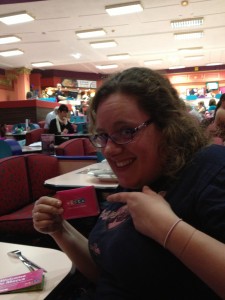 Favourite WBN work related happening of 2013: Part of ‘Walking Stories’, our outreach project at the Bike Shed: hearing Ryan’s stories first hand and then seeing his monologue performed by three different actors and his story being interpreted on stage with images. All with him in the audience enjoying his moment of fame.
Favourite WBN work related happening of 2013: Part of ‘Walking Stories’, our outreach project at the Bike Shed: hearing Ryan’s stories first hand and then seeing his monologue performed by three different actors and his story being interpreted on stage with images. All with him in the audience enjoying his moment of fame.
Favourite WBN non-work related happening of 2013: Fun with dabbers on my first ever bingo experience at Mecca Bingo in Scarborough!
Something that was hard or difficult in 2013: Navigating to our cottage in the dark in Exeter – deeply stressful, writing our application to become a Community Interest Company (drafting and redrafting our aims) but really worthwhile. Preparing the curtain-raisers for ‘Walking Stories’ in only one day!
Something you’re looking forward to in 2014: Bringing Reasons to a larger audience (and redirecting it with a different Joseph).
Lucy:
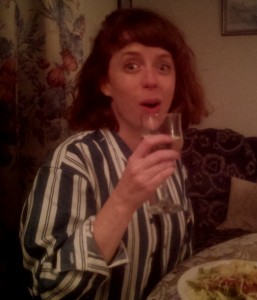 Favourite WBN work related happening of 2013: Watching the penultimate performance of Beneath the Albion Sky at the Bike Shed Residency. It had been preceded by a curtain raiser performance of ‘Walking Stories’ which was created using stories collected from members of the local Headway group. It was wonderful to see the stage as an equal playing field for people of all backgrounds and experiences to have their stories told. The mix of producing work with theatre professionals as well as with local communities is my ideal way of working! So, when WBN asked me to be an Associate Artist of theirs directly after this show I rather gushingly and over enthusiastically accepted! And that is my favourite WBN work moment of 2013.
Favourite WBN work related happening of 2013: Watching the penultimate performance of Beneath the Albion Sky at the Bike Shed Residency. It had been preceded by a curtain raiser performance of ‘Walking Stories’ which was created using stories collected from members of the local Headway group. It was wonderful to see the stage as an equal playing field for people of all backgrounds and experiences to have their stories told. The mix of producing work with theatre professionals as well as with local communities is my ideal way of working! So, when WBN asked me to be an Associate Artist of theirs directly after this show I rather gushingly and over enthusiastically accepted! And that is my favourite WBN work moment of 2013.
Favourite WBN non-work related happening of 2013: Arriving at the official WBN cottage in Exeter in the pitch black. Then waking up at 7am the next morning and discovering we were surrounded by green fields and hills. And then going out in my pyjamas to frolic with the local dogs and horses….much to the dismay of other WBN members who I woke with my squealing.
Something that was hard or difficult in 2013: As an actor / freelancer it is always the bits in between acting work that are the most genuinely difficult. It means though that you flipping love when your real work comes along and difficulties within that theatre / acting work are just exciting challenges to be creative with!
Something you’re looking forward to in 2014: Work in progress performance of Regeneration at Rich Mix. And also working on my own writing ideas.
